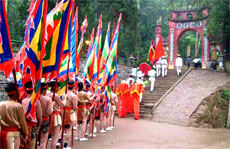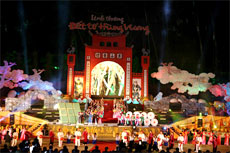The Ministry of Culture, Sports and Tourism and the People’s Committee of Phu Tho Province are urgently completing a dossier to submit to UNESCO for recognition of the “Belief and Hung Temple Festival†as an Intangible Cultural Heritage of Humanity.

Previously, the province had submitted documents to the UN Educational, Scientific and Cultural Organisation (UNESCO) to seek recognition of the local ‘Hat Xoan’ singing as an intangible World Intangible Cultural Heritage in need of urgent protection.
Pham Sanh Chau, Director of the Department of External Culture and UNESCO under Ministry of Foreign Affairs, said that if things go as planned, the UNESCO will announce its decision on the two applications in 2011.
Director of the Hung Temple historical site, Nguyen Tien Khoi, said that there are more than 600 places nationwide that worship the Hung Kings, their generals and their families but the largest number of them is found at the Nghia Linh Mountain historical site in Hy Cuong Commune, Phu Tho Province.
The Hung Temple Festival has been held annually since 1460 under the reign of King Le Thanh Tong to commemorate the 18 Hung Kings who founded the country and started a golden age in Vietnamese history.
Since then, the Hung Temple Festival has become a symbol of national unity and spirit and is a chance for Vietnamese people both at home and overseas to express their gratitude to their ancestors.
The anniversary of the death of the Hung Kings, which falls on the 10th of the 3rd lunar month, was officially recognised as a national celebration in 2000 and in 2007 the National Assembly approved a regulation making it a national holiday.
The Hung Temple is located on Nghia Linh Mountain, Phong Chau District, in Phu Tho Province, 100km northwest of Hanoi and is a complex of ancient tombs, monuments and temples.
Notably, the Lower Temple, a popular tourist destination, was according to legend, where Au Co gave birth to a sack containing 100 eggs from which 100 babies were born. The eldest son, Hung Vuong, named himself king and the throne was passed down over 18 generations.
This year’s Hung Temple Festival is being held on the largest-ever scale from April 14-24

(the first to the tenth day of the third lunar month). Cities and provinces across the country will also celebrate the festival at places of worship dedicated to the Hung Kings.
“Hat Xoanâ€, a kind of folk song from northern Phu Tho Province, is believed to have been created more than 500 years ago. It is not only popular in 18 communes along the Lo River in Phu Tho Province, but is also sung in the midland and northern regions.
“Hat Xoan†is similar to a lullaby. As with “Quan Hoâ€, many of the songs are about love, but it is also a kind of folk music that praises village genies.
There are many forms of “Hat Xoan†including duets and choirs, all accompanied by several kinds of dances.
Xoan festivals are often held in spring in village temples. On the 5th day of the 1st lunar month it is often sung at the Hung Temple Festival.